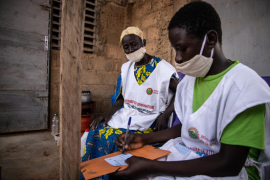Application period: 23-Feb-2021 to 16-Mar-2021
The East Africa Community (EAC) is a Regional Economic Community established under Article 2 of the Treaty for the Establishment of the East African Community as amended in 2010, amongst its objectives in the EAC Protocol on Health, to coordinate regional efforts on epidemic preparedness, mapping, prevention, control and where possible the eradication of communicable and non-communicable diseases. The 9th Ordinary Meeting of the EAC Sectoral Council of Ministers on Health Directed the EAC Secretariat to finalize the development of the Malaria Action Framework for the East African region and develop a funding proposal to Global Fund on HIV, Malaria and Tuberculosis and to other Partners to support implementation of the Malaria Framework.
Reporting to and under the leadership and guidance of the Country/Regional Support Partner Committee (CRSPC) Manager, in collaboration with the Head of Health Department at WAHO secretariat as part of the execution of this assignment, the EAC Regional Malaria Coordinator will undertake, among others, the following specific tasks:
Implementation of the East Africa Malaria Programme
- Coordinate a comprehensive desk review of social and environmental determinants of malaria at four levels; society, environment, population group, and household and individual, to inform the developmental strategies and multi-sectoral engagement approaches for malaria control in the Greater Lake Region. Existing engagement efforts should be acknowledged, and best practices identified.
- Based on task #1 above, propose which sectors should be involved in the delivery of national malaria control interventions. This includes concrete proposal of “how” (mechanism) the different sectors will be engaged and Mainstreaming Malaria.
- Coordinate a SWOT analysis of proposed mechanisms of engagement and propose tools for negating challenges of disharmonies across sectors’ that are associated with difficulty in collaboration and Mainstreaming Malaria in other relevant sectors.
- In collaboration with the National Malaria control programmes, coordinate the development of a mechanism for inter-sectoral financing of implementation of the framework and plan covering both conventional malaria interventions, functions addressing other determinants of malaria within the different sectors and household level interventions impacting on malaria control. In addition, identify and stratify respective roles and responsibilities of different sectors and stakeholders in implementation the multi-sectoral plan and realization of national malaria control and elimination targets;
- Coordinate and develop a plan for operationalizing the multi-sectoral framework with specific measurements of success (Monitoring and Evaluation).
- Coordinate essential, mutually agreeable cross-border collaborative activities such as synchronized malaria interventions and/or complementary approaches directed at intensified control and elimination tailored to the local context. This, including coordination of the implementation of activities developed under the RBM-ALMA-EAC Tripartite Memorandum of understanding
- Facilitate the establishment of a regional cross-border malaria data-sharing and visualization platform for complementary action in response to active transmission across borders, including harmonization with the existing one in the EAC countries.
- Establish and agree upon a regional M&E framework and monitor all EAC regional malaria control activities including the cross-border activities. •
- Review progress on EAC cross-border collaboration for malaria elimination by careful reporting to regional committees.
- Initiate or revitalize existing EAC regional coordination mechanisms for cross-border collaboration, including sub-regional coordination activities to maximize the impact of the resources from the Global Fund to countries in the region, and
- Collaborate with other existing cross-border mechanisms, organizations and sectors including communities and civil society networks.
- Strengthen and scale up partnerships with the Global Fund for harmonized actions and better resource sharing to leverage and complement, but not duplicate bilateral partner investments across these countries.
- Support the smooth running of the EAC Malaria and NTD Unit Coordination Secretariat
- Any other duties as may be assigned by the EAC head of Health Department.
Implementation of the Great Lakes Malaria Initiative
- Facilitate the country and regional validation of the Draft Great Lakes Malaria Initiative Regional Malaria Strategic Plan 2020-2024, the collaboration framework;
- Coordinate the Development of Concept note EAC Regional Malaria Multisectoral Action Framework and Plan 2019-2030
- Cause and coordinate the development of a Concept note and funding proposal for the EAC Malaria Multisectoral Action Programme (EMMAP).
- Cause and coordinate the development of a Concept note and funding proposal for EAC and Great lakes cross border Malaria Control Initiative
Monitoring and Progress Controls
By design, the assignment will require broad stakeholder engagement and consultations. The consultation will propose the approach and methods for ensuring extensive engagement at different stages of the development process. Key informant interviews, consultation, consensus and validation meetings should be considered for wider buy-in and involvement. The RBM will support the Regional Coordinator to mobilize stakeholders for consultations. The framework and plan will be presented to different multi-sectoral platforms and input and buy-in including EAC.
